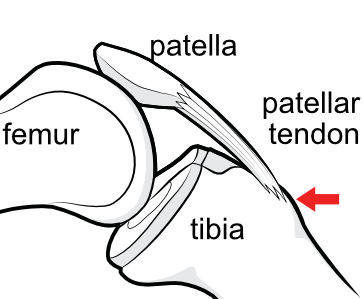The tibial tuberosity or tibial tubercle is the bony lump on the shin below the kneecap (patella) where the patellar tendon attaches.
 Page updated June 2024 by Dr Sheila Strover (Clinical Editor)
Page updated June 2024 by Dr Sheila Strover (Clinical Editor)

What is a growth plate?
A growth plate, like that seen in the tibial tuberosity in younger people, is a region that has higher cell production and turnover, allowing for regional new growth in the bone.
As the child matures, the growth plate transforms into solid bone, but until then it is especially vulnerable to injury.
-
Quote from peer-reviewed paper:
"...when an injury occurs with the knee in full extension, or close to 30° of flexion, avulsive fractures of the tuberosity occur without involvement of the proximal epiphysis of the tibia; when flexion exceeds 30°, both structures tend to sustain injury"
Citation: Rodriguez I, Sepúlveda M, Birrer E, Tuca MJ. Fracture of the anterior tibial tuberosity in children. EFORT Open Rev. 2020 May 5;5(5):260-267. doi: 10.1302/2058-5241.5.190026. PMID: 32509330; PMCID: PMC7265087.
Why is the tibial tuberosity sometimes problematic?
In young people who do a lot of jumping sport, there may be painful traction on the growth plate of the tibial tuberosity.
This may lead to painful enlargement of the bony lump (Osgood Schlatter's disorder) or the bone may actually fracture there (tibial tubercle avulsion).
In addition, graft harvest of the patellar tendon for cruciate ligament reconstruction (B-PT-B) and various alignment disorders of the quads, patella, and trochlear groove (eg trochlear dysplasia) may also result in stress on the tibial tuberosity.
-
Quote from peer-reviewed paper:
"...fracture of the tibial tuberosity in adults is usually due to a complication of anterior cruciate ligament reconstruction with autologous patellar tendon graft..."
Citation: Pires e Albuquerque R, Campos AS, de Araújo GC, Gameiro VS. Fracture of tibial tuberosity in an adult. BMJ Case Rep. 2013 Nov 29;2013:bcr2013202411. doi: 10.1136/bcr-2013-202411. PMID: 24293543; PMCID: PMC3847511.
What is a tibial tuberosity transfer (TTT)?
The tibial tuberosity is the lower attachment of the patellar tendon, and it helps to keep the patellar in the groove of the femur, helping to make contraction of the whole quads muscle more effective in straightening the knee.
If the alignment of quads, patella, patellar tendon is not optimal it may result in pain in the front of the knee. By cutting and moving the tibial tubercle, a better alignment may be restored.
-
Quote from peer-reviewed paper:
"...Some of the common complications associated with this procedure have been pain and discomfort due to -lexicon][noprominent[/no-lexicon] screw heads, necessitating their removal; nonunion and delayed union of the osteotomy; and failure of fixation..."
Citation: Pemmaraju G, Raad A, Kotecha A, Chugh S, Mughal E. Modified Technique of Tibial Tuberosity Transfer. Arthrosc Tech. 2015 Aug 10;4(4):e349-52. doi: 10.1016/j.eats.2015.03.009. PMID: 26759775; PMCID: PMC4680919.
Forum discussions
- New Member: Knee pain since 1996
Several stories about tibial tuberosity transfer for patellofemoral pain.
Relevant material -
 2018 - Arthroscopic excision of an Osgood Schlatter ossicle - by Dr Lars Blønd (Knee Surgeon)
2018 - Arthroscopic excision of an Osgood Schlatter ossicle - by Dr Lars Blønd (Knee Surgeon)